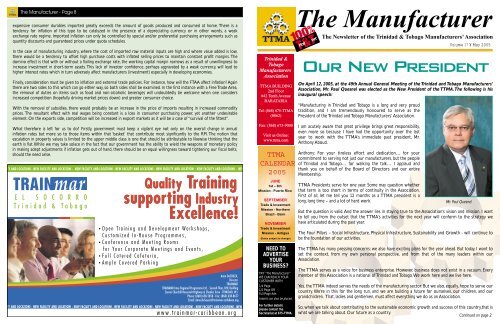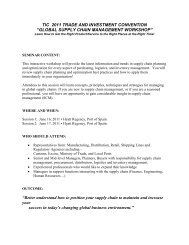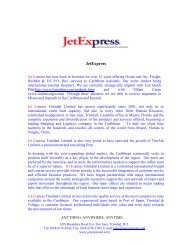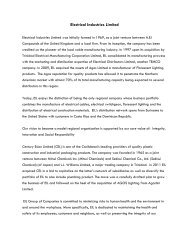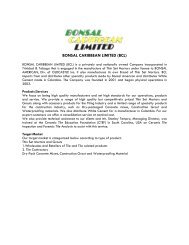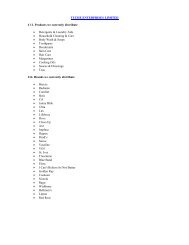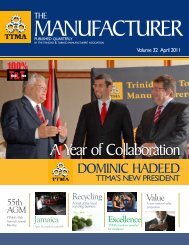Our New President - Trinidad and Tobago Manufacturers' Association
Our New President - Trinidad and Tobago Manufacturers' Association
Our New President - Trinidad and Tobago Manufacturers' Association
Create successful ePaper yourself
Turn your PDF publications into a flip-book with our unique Google optimized e-Paper software.
<strong>New</strong> Membersof the BoardMr. Nicholas Mouttet,Managing Director,Alstons BuildingEnterprises Ltd.Dr. Trevor Townsend,Chief Executive Officer,<strong>Trinidad</strong> Aggregrate Ltd.Mr. Greig Laughlin,Chairman, AdvanceTyre Systems Ltd.Dr. Peter Smith,Vice <strong>President</strong>,Alliances, Universityof <strong>Trinidad</strong> & <strong>Tobago</strong>I think very often we have a problem in underst<strong>and</strong>ing the effect thatcertain developments have on each individual’s life. Let me take a case inpoint, <strong>and</strong> one very near to me. I recently served as the Chairman ofthe TTMA’s Physical Infrastructure Committee, where the hot issue wasof course, the Port.We all know that there are problems on the port, that businesses aresuffering because their goods have been delayed … both raw materials<strong>and</strong> finished goods to market… but I wanted to be able to explain whatit really meant using a tangible example.I chose a twenty foot container holding forty thous<strong>and</strong> pounds of splitpeas, <strong>and</strong> did my calculation in U.S. Dollars:• In October 2004, a new Bunker Charge was added. Cost: $46• In November 2004, another Bunker Charge: Cost $115• On April 5, a General Rate Increase: Cost $150• Plus a Port Congestion charge: Cost $65That amounted to new charges of US$376 imposed during a six monthperiod. Converted to TT: that’s $2,369, <strong>and</strong> that translates into anincrease of six cents per pound for split peas – on freight only. Thinkalso, potatoes, onions… inputs to manufacture. By extension ourexport prices have risen, making us less competitive.So, today we face a huge challenge at our ports. Is it a problem forbusinesses? Yes. But I want to go further <strong>and</strong> say that these thingscannot be so easily pigeon-holed. Every single thing that happens hereaffects each one of us personally in some way.We face a grave challenge in this country: <strong>Our</strong> state of mind haschanged, hugely <strong>and</strong> dramatically. Right now we are in the midst of anepidemic of pessimism. An epidemic that has everything to do with howdifficult it has become to simply live your life in <strong>Trinidad</strong> <strong>and</strong> <strong>Tobago</strong>.Every citizen in this country has a right to certain things: water…electricity… shelter… affordable food… safety… healthcare…education… <strong>and</strong> transportation systems that allow us to move aroundin a timely <strong>and</strong> efficient manner.Without these things we cannot perform, <strong>and</strong> we cannot create the lifewe want to live. Life becomes a rat race, <strong>and</strong> we cannot be that peoplewe have the potential to be.Let me take this argument a step further. We are powerfully affected bythe things that surround us, our behaviour changes when we walk downa clean street. If we are sitting in hopeless traffic we become – angry.Now, before you say to me that this is a problem with no solution, Iwant to say to you...seemingly minor things have major consequences.The TTMA’s Literacy in the Workplace Programme for instance, is asmall thing, so is our partnership with the Business Sector SchoolIntervention Programme.But together all of our activities add up to help drive change in oursocial infrastructure, <strong>and</strong> simply to make people’s lives better.Ladies <strong>and</strong> gentlemen, If pessimism is contagious, then so is optimism.”TTMA Brief: Inflation <strong>and</strong> the ManufacturerInflation, one of the big macroeconomic issues of our time, is also one that is continually misunderstood by many. Whenever theword inflation is used; be it by a Central Bank Governor, University Lecturer or <strong>New</strong>spaper Editor, the resultant response is thesame…things bad! What most do not know is that inflation occurs in all countries <strong>and</strong> therefore affects all societies withoutexception.Inflation is generally defined as a persistent rise in the general price level, that price level being calculated by the rise in the priceindex for a ‘basket’ of goods <strong>and</strong> services commonly consumed by households, over a period of one year. This rate is calculatedusing a weighted system also called a Retail Price Index (RPI) which is constructed by assigning weights to reflect theimportance of the individual items in the basket.In order to manage inflation, Government must execute a combination of both monetary <strong>and</strong> fiscal policy measures to ensurethat prices do not spiral out of control. By this one can interpret that there are different degrees of inflation (percentages) <strong>and</strong>it is the size of the variance in the inflationary rate that affects countries, each with its own level of inflation to manage.So in itself, inflation is not necessarily malignant but what is more important is how incremental the changes in inflation levelsare, what are the major contributing factors to increases in the rate, whether these can be managed in the short or long-term<strong>and</strong> how?Many economists will advocate keeping the inflation rate to as low a percentage as possible, the lower the better. In mostdeveloped <strong>and</strong> some developing countries this is usually possible with policy combinations as mentioned earlier, but in othercountries, this may not be possible given the dependence on exchange rates, imports, interest rate fluctuations <strong>and</strong> levels ofcapital flows including foreign direct investment.For manufacturers, inflation can affect the entire production chain, from material inputs to transportation costs (as a result offuel price increases). One important contributor to the rate of inflation that government has been charged with seeminglyignoring is that of real estate prices <strong>and</strong> housing costs, whether ownership or rental. A recent editorial article cites totalhousing as contributing to just over twenty-six (26) percent of the Retail Price Index (RPI) as compared to Food <strong>and</strong> Nonalcoholicbeverages which contributes eighteen (18) percent to the RPI.Further to this, escalating construction costs are the major factor resulting in increased real estate prices which in turn hasfuelled inflationary expectations over the past year or so. Government seems confident however that it is fully equipped withthe necessary tools to control inflation rates such that they would not exceed reasonably expected levels.Another issue is that of the cost of labour <strong>and</strong> the effect this has on inflation. Many believe that this “chicken <strong>and</strong> egg” situationcan go either way, in that salary dem<strong>and</strong>s <strong>and</strong> wage settlements are based on rising prices, while large wage increases result inincreased inflation.Government must be cautious that sectorally high wage differentials <strong>and</strong> wage settlements do not set dangerous precedents ofincreased-wage expectations throughout the country. If this is so, there would be nationwide social <strong>and</strong> political consequencesresulting from such actions.The answer to this double-edged sword is to keep real wages (purchasing power) constant while increasing nominal (monetary)wages in line with productivity increases. The theory is that if productivity increases at the same rate of increase in labour costs,the cost (price) of goods <strong>and</strong> services are not affected. For manufacturers <strong>and</strong> the private sector in general, this is an importantpoint to note.Manufacturers, from the production side, must find ways of curbing transportation costs as well as inputs into manufacturing,especially fuel. This responsibility must be shared as the onus is on both Manufacturers to lobby for, <strong>and</strong> Government to providemanufacturers with an efficient <strong>and</strong> affordable energy supply <strong>and</strong> a hassle-free system of moving goods in <strong>and</strong> out of thecountry.Another issue to consider is that of imported inflation. Imported inflation occurs in economies where the quantity of relativelyContinued on page 8.
The Future of the PortUpdate on Special Meeting with the Minister49th Annual General MeManufacturers are faced with serious challenges regarding theimport <strong>and</strong> export of goods from <strong>Trinidad</strong> <strong>and</strong> <strong>Tobago</strong>, includingincreases in shipping costs, general rate increases, bunkercharges <strong>and</strong> congestion surcharges. On April 13th 2005, at aspecial session on “The Future of the Port” hosted by theTTMA, the Honourable Franklin Khan, Minister of Works <strong>and</strong>Transport addressed members on the short-, mid- <strong>and</strong> longtermplans for the Port of Spain port. Presentations were alsomade by Mr. Narine Singh, Acting General Manager & CEO,Port Authority of T&T <strong>and</strong> Mr. Noel Garcia, Chairman, PortAuthority of T&T.Total funding for the Port’s operations st<strong>and</strong>s at $TT718.8M.Major challenges discussed included Space, Equipment Pricing<strong>and</strong> Management Systems. The Minister identified increasingdem<strong>and</strong> challenges (see table) <strong>and</strong> noted that the diverse rangeof activities at the Port, including cruise ship visits, affect itscore operation - cargo h<strong>and</strong>ling.According to the Minister, the solution is to restructure theorganisation, making room for two subsidiary companies: ThePort of Port of Spain (PPOS), <strong>and</strong> the Port of Spain InfrastructureCompany (POSINCO). Business Plans for POSINCO <strong>and</strong> PPOShave already been drafted <strong>and</strong> presented to the PATT Board, <strong>and</strong>the Minister promised that a Communication Plan would beimplemented starting April 22, 2005.Short Term (January – June 2005)∆ Space:• Paving of Spectrum 3.1 Ha (2005 April )• Acquisition of 7.5 Ha south of Spectrum for emptycontainer storage∆ Equipment:• Ordered 3 Empty Container H<strong>and</strong>lers, 2 ReachStackers,15 Trailers, 1 Flat Rack Lift truck,• Tenders invited for 12 tractor trucks, 5 RTG’s & a fourthShip-to-Shore Crane∆ Management:• Restructuring of PATT – Operationalisation of POSINCO& PPOS (Apr 2005)• Implementation of a Container Terminal ManagementSystem (Mar 2005)∆ Pricing:• Consultant hired to review existing pricing regime <strong>and</strong>submit appropriate recommendations∆ Institutional Enablers:• Preparation of business plans for POSINCO & PPOS• Conclusion of negotiations with ICTSI• Completion of R.F.P.s for Port Management Consultancyshould negotiations with ICTSI be unsuccessfulMid Term (July 2005 –December 2007):∆ Space:• Relocation of Sheds #9 & #10 (Sep 2005)• Paving Shed #9 area• Engage Consultant to consider requirements forrelocation of the Port.∆ Equipment:• Acquisition of 5 R.T.G.’s & 12 Tractor Trucks• Purchase of one Ship-to-Shore Gantry Crane• Implementation of a Computerized MaintenanceManagement System• Outsourcing of non-critical aspects of equipmentmaintenance• Construction of Equipment Maintenance Complex∆ Management:• Container operations-based employee training• Implement software solutions, policies & proceduresconsistent with industry best practice∆ Pricing:• After appropriate consultation, implement revised tariffLong Term (5 years)∆ Space:• Review layout of the container terminal• Convert empty container storage to full containerstorage• Port relocation∆ Equipment:• Replacement of Ship to Shore Cranes #1 & #2∆ Management:• Operationalise remaining companies∆ Pricing:• Continuous review of market conditionsTwenty Foot Equivalent Units (TEU’s) h<strong>and</strong>ledat the Port of POS2002 300,0002003 340,0002004 350,4682005 Anticipated increase of 8%WELCOME NEW MEMBERSThe TTMA Family continues to grow <strong>and</strong> to attract companies who like what we are doing.We welcome these new members <strong>and</strong> look forward to seeing you at Seminars & Trade Missions.INTERNATIONAL COSMETICS LIMITEDICL Drive, Bhagowatie TraceSAN JUAN, TRINIDAD W.I.PHONE: (868) 675-5776FAX: (868) 675-2674E-MAIL: icl @carib-link.netSenior Executive: Carl LakhansinghCompany Representative: Aniel LakhansinghProduct(s)/Services: Cosmetics/Personnel Care Products/Household CleanersJB S FLAGS & EMBLEMS CO. LIMITED57 Duke Street (near Picadilly Street)PORT OF SPAIN, TRINIDAD W.I.PHONE: (868) 627-1050/623-0930FAX: (868) 627-1050E-MAIL: info@jbflags.comSenior Executive: Adrian Baker/Joan BakerCompany Representative: Adrian BakerProduct(s)/Services: Flags, Banners, Independence DecorationsB.H. ROSE LIMITED11-13 Milling Avenue, Sea LotsPORT OF SPAIN, TRINIDAD W.I.PHONE: (868) 625-1571/423-0930FAX: (868) 625-2308E-MAIL: bhr@tstt.net.ttSenior Executive: Martin NguiCompany Representative: Anthony InglefieldProduct(s)/Services: Manufacture /Installation of AluminumWindows, Doors <strong>and</strong> Curtain WallsUNIQUE WOODWORKING LIMITED53-55 Don Miguel Ext Road,SAN JUAN, TRINIDAD W.I.PHONE: (868) 674-4092FAX: (868) 638-1539E-MAIL: uniquewood@tstt.net.ttSenior Executive: Harvey Sooree, (MD), Richard Sooree, (D)Company Representative: Haroon Mohammed (Accountant)Product(s)/Services: Custom Doors & Windows, Staircases &Hardwood FloorsAMERIJET CARIBBEAN EXPRESS LIMITEDPiarco International Airport - SouthsideTRINIDAD W.I.PHONE: (868) 669-2138FAX: (868) 669-2013E-MAIL: dmckell@amerijet.com / spantin@amerijet.comSenior Executive: Simon Pantin (D)Company Representative: Deborah McKellProduct(s)/Services: Airline/Cargo


